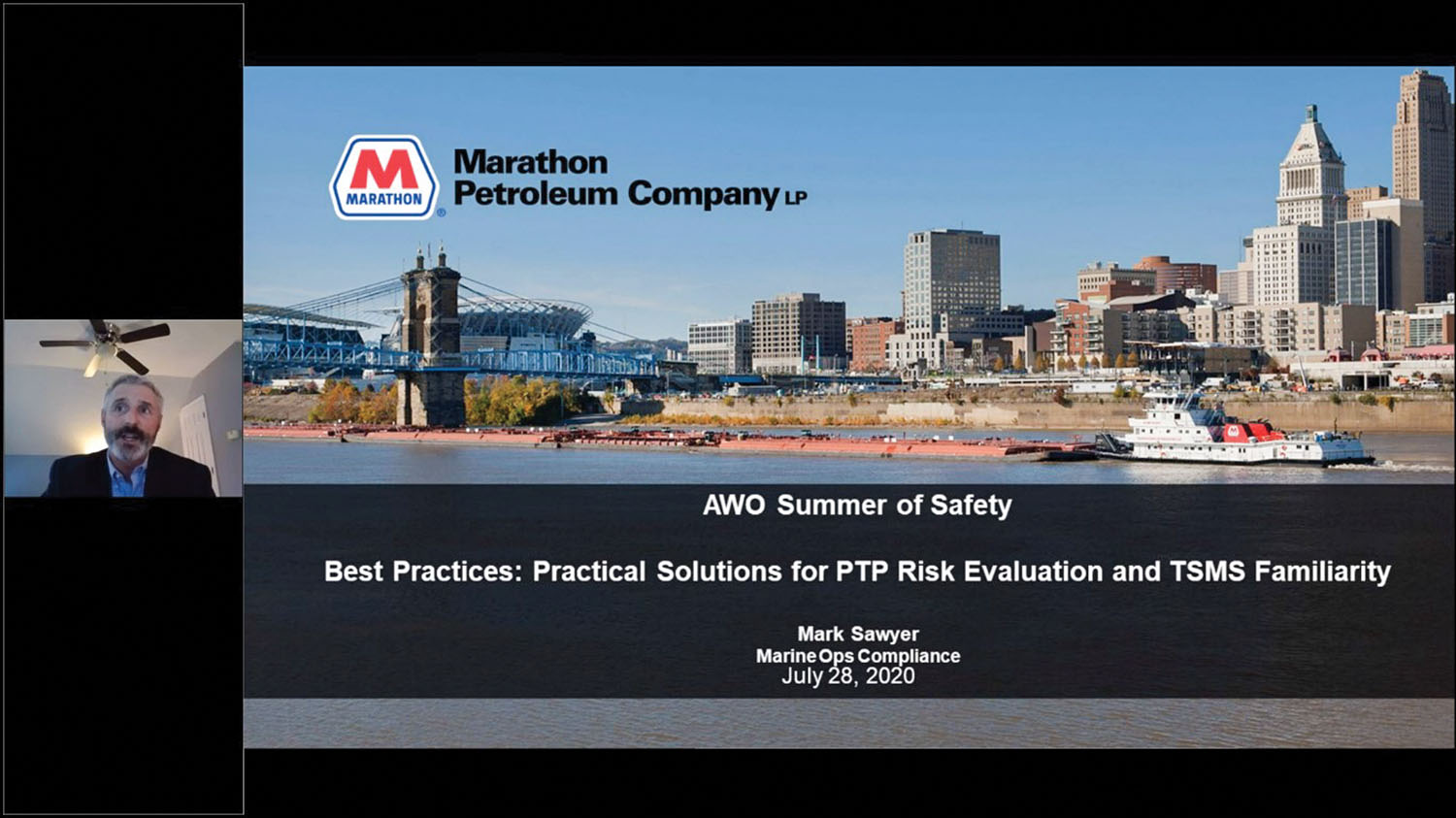The onset of the coronavirus pandemic back in the spring caused many industries and companies to scramble. It disrupted some more than others but left no one unaffected. States and localities responded with a range of restrictions and lockdown strategies that are still being adjusted and debated as new information continues to emerge about who is most at risk for the coronavirus, which precautions continue to be necessary and which might be relaxed or modified.
As an essential industry, one used to quickly responding to many types of crises, the towing and barge industry rapidly put in place a variety of safety precautions and procedures. It followed the recommendations of the Centers for Disease Control and developed its own procedures for its unique circumstances. Towboats and barges continued to move safely and efficiently.
Companies looked for ways to share their lessons learned and success stories. As office meetings were held via videoconference, organizations with distributed workforces found that they had to become media companies as well, if they weren’t already.
This wasn’t a brand-new role for The American Waterways Operators. As CEO Jennifer Carpenter pointed out, “We had already been offering webinars for our members on safety and other topics before the COVID-19 pandemic restrictions were in place.” So it was logical that an important part of the towing industry’s response to the coronavirus was the recently concluded “Virtual Summer of Safety” series of webinars organized and hosted by AWO.
Held remotely, the initial webinars concentrated at first on topics related to the COVID-19 virus and measures for combatting it. But the series soon expanded into a broader range of safety topics. This was in response to industry requests. As Matt Lagarde, chairman of the AWO Interregion Safety Committee and assistant vice president, HSSE, Ingram Barge Company, explained, “Despite the towing industry’s hyperfocused attention on dealing with COVID-19, AWO’s safety leaders felt strongly that we should offer a wide range of safety topics and trainings, similar to what AWO members would see and hear at an in-person Safety Committees meeting. It was also important for us to adapt these remote offerings so that participants had the ability to ask questions and engage with presenters as if those presenters were in front of a ballroom at a podium and we were passing around a microphone.”
Brian Bailey, AWO’s director of safety and environmental stewardship, said, “The importance of convening the broader towing industry community to learn about and engage on safety issues is more critical than ever. That was the impetus for the development of AWO’s Virtual Summer of Safety. The pandemic demanded [that] AWO get creative in continuing to provide our members with high-quality, cutting-edge educational webinars on a range of timely safety topics.”
“By all accounts,” he added, “the initiative was a success and the robust participation and engagement of AWO members and guest experts over the three months made it even more so. Despite the ongoing challenges of the COVID-19 pandemic, which led to the cancellation of the Safety Committees’ summer meeting in Chicago, AWO members demonstrated that their commitment to safety leadership and learning is steadfast with nearly 1,000 combined views of the eight webinars.”
In keeping with the topic dominating the news cycle, Bailey said, the two webinars that had the highest attendance were part of the “Addressing COVID-19” webinar sequence: “Returning to the Office” and “But I Don’t Want to Wear My Face Mask!” However, a “grab-bag” webinar that featured lessons learned and best practices, and the webinar on falls overboard prevention programs also proved popular.
The response to the remote webinars has been so positive, said Carpenter, that she expects them to continue in some form even after regular travel is able to resume, whenever that is.
“This is a resource we plan to continue offering on a variety of topics, with an emphasis on content that has immediate operational applicability, that members can take and go use in the field. One of the great benefits of a remote format is expanding access to members who just can’t break away from the office to attend an in-person meeting. We’ve heard from executives with large companies who like the ability to jump on Zoom or Teams for a couple of hours instead of losing a day or more to travel, and folks from small companies who are stretched so thin they just can’t leave the office for an in-person meeting, and now have a way to participate. So, going forward, I expect we’ll have a mix of in-person and virtual events to give members the best of both worlds:the opportunity for in-person networking that you only get with a live event, and the opportunity for broader participation that a virtual format allows.”
The fact that these events can be recorded and stored for repeated viewing is an additional benefit. “The Virtual Summer of Safety reaffirmed for us that there continues to be strong member demand for dynamic, interactive learning and information exchange opportunities. Looking ahead, we will be focusing on ways to maximize live attendance while also distributing recorded webinars for viewing as widely as possible,” Carpenter said.
As Marino Hwang, chairperson of the AWO Coastal Safety Committee and Marine Compliance Manager/DPA at McAllister Towing, put it, “No matter what your position—shoreside or afloat—or towing industry sector—coastal or inland—you’re operating in, the Virtual Summer of Safety series had something of interest for everyone, with real-world safety takeaways and examples.”




